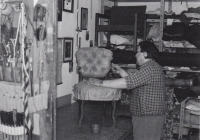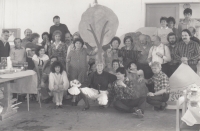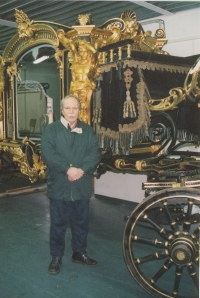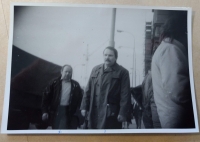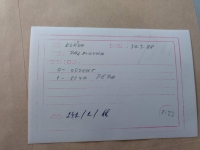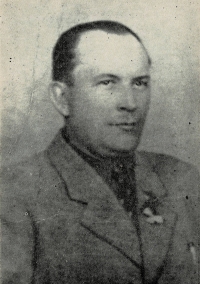"In 1976, I was convicted because the prosecutor appealed after six months and I went to the prison. First, we were here in Budějovice. Probably because they were locals and because the State Security officers were quite within reach, to that prison, it was probably the hardest part of the prison I've ever experienced - in the seventy-six. They took us to work in Volary, by bus from Budějovice. We left at five in the morning, we arrived to Volary at six. There we built a hall for chipboards. There was a whole bus of us. I had my hands from the needle, just as I was used to working with the needle. And now I had to work with a shovel. Physically I felt I could do anything. I was supposed to work with a shovel, and after about 14 days some Captain Pavlíček said: 'Sloup speed up, you should speed up.' And we threw concrete with stones, which we threw with a shovel into a japan, it's called - such wheels that are grabbed by a crane, they are taken up to the roof and there it is used as a backfill. Seven, seven concrete mixer trucks a day. This is the kind of mixer that comes with a truck, it arrives, pours concrete on the ground and we shoveled it into the Japan. And they left again and came again. Every hour, it was one mixer truck. The two of us threw it there with a shovel and I had my hands full of blisters, as I was not used to working with a shovel. And now Captain Pavlíček said that I should speed up, that I should speed up. There was nothing to add, because, what they brought, we threw it there and there was nothing left. Not that I should go dig something, between the arrival of another mixer truck. I said, look, my hands are so sore. "You will work until you have one big blister in your hand, not so many blisters," said Captain Pavlíček. We once arrived at the prison with a bus, and before the gate opened, my wife walked around the prison. My wife and our children walked around the prison. At that time I had a four-year-old son and a three-year-old daughter. So, we probably waved at each other. Then, I was banned from receiving letters and packages for six weeks. I got extra tasks, every time we came from work. He told me it was for six weeks because of an illegal contact with civilians. In addition, Captain Pavlíček included me into a group of about eight boys, he called it physical education."
